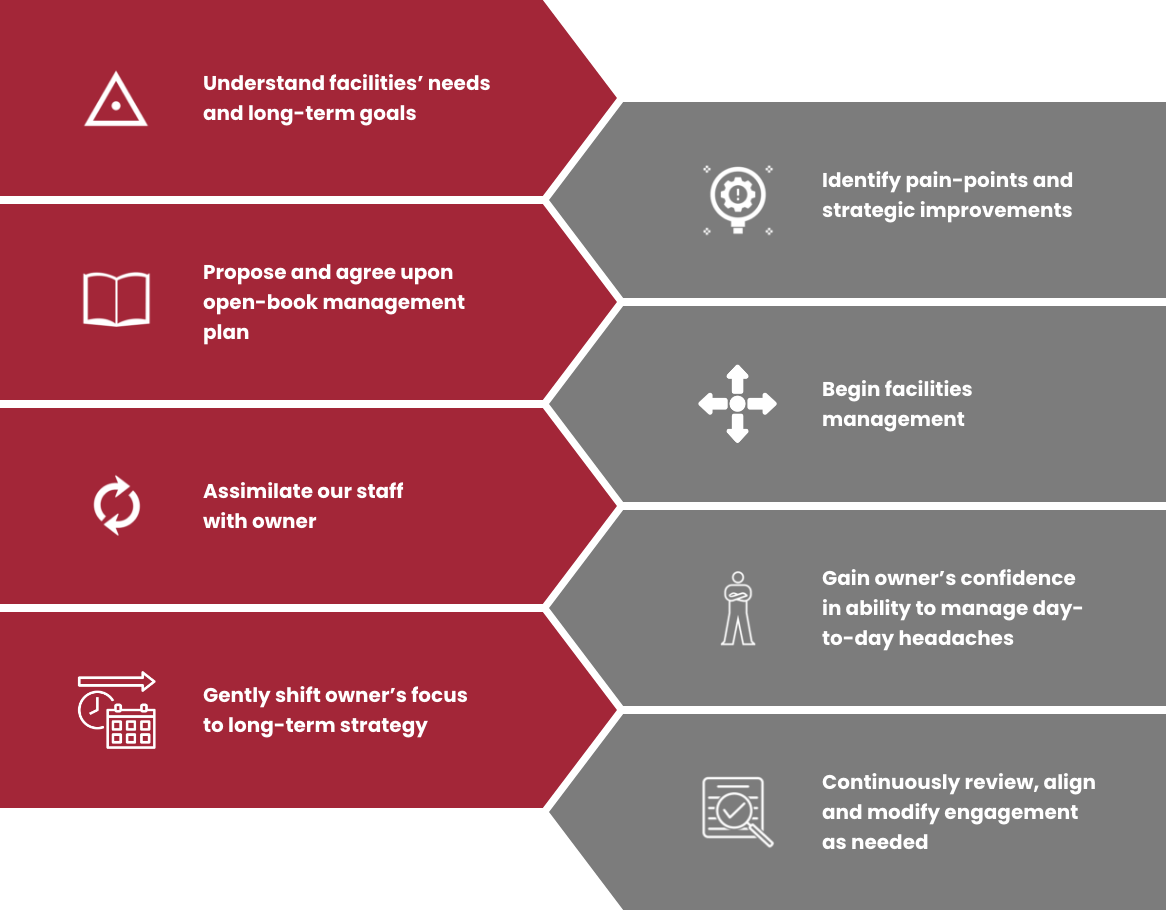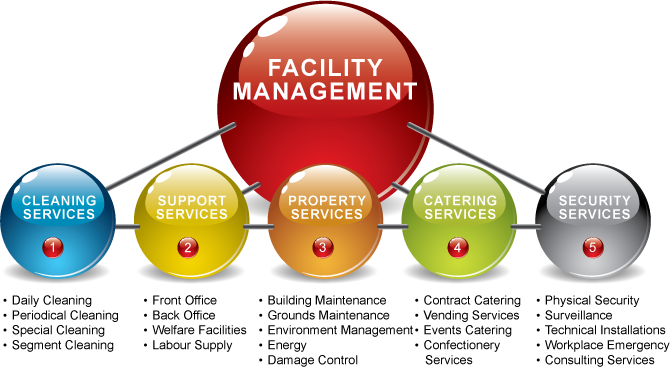Secret Fads Forming the Future of Facility Management in 2024
As we look in advance to 2024, the landscape of facility management is positioned for substantial transformation, driven by numerous crucial patterns. The integration of clever structure technologies and a change towards data-driven decision-making promise to boost operational effectiveness while prioritizing sustainability in practice.
Smart Structure Technologies

Smart building technologies include a large variety of systems, consisting of intelligent illumination, a/c controls, and protection systems. By incorporating these systems, center managers can keep track of and change specifications in real-time, causing considerable decreases in energy waste and functional expenses. As an example, smart sensors can detect occupancy degrees and adjust lighting and temperature level accordingly, making certain that power is just utilized when needed.
Moreover, these modern technologies promote improved information collection, permitting companies to track usage patterns and identify opportunities for further renovations. The implementation of wise building modern technologies not only adds to sustainability goals yet also creates healthier workplace that can increase employee efficiency and contentment.
As we move into 2024, the adoption of smart structure modern technologies will likely accelerate, mirroring a broader shift in the direction of more intelligent, receptive, and lasting center monitoring methods.
Data-Driven Choice Making
Progressively, organizations are leveraging data-driven choice making to enhance facility administration practices. By taking advantage of information analytics, center supervisors can acquire actionable insights that considerably boost operational efficiency and source allowance. The assimilation of innovative modern technologies, such as IoT sensors and real-time tracking systems, enables the collection of large amounts of information on building performance, tenancy rates, and power usage.
This wide range of information allows facility managers to identify patterns, predict upkeep needs, and proactively address problems before they rise. For example, predictive analytics can anticipate devices failures, reducing downtime and repair costs. In addition, information visualization tools assist in better interaction amongst stakeholders, making sure that notified decisions are made collaboratively.
Furthermore, data-driven strategies boost calculated planning by making it possible for facility managers to analyze the performance of current methods and make informed selections concerning investments in innovation or facilities. As companies increasingly focus on functional excellence, data-driven decision making is positioned to come to be a cornerstone of successful center monitoring approaches in 2024 and past. Ultimately, the capacity to take advantage of information effectively will equip organizations to develop much more effective, efficient, and durable facilities.
Sustainability and Eco-friendly Practices
The emphasis on data-driven decision making naturally lines up with the growing concentrate on sustainability and green techniques within facility monitoring. As organizations increasingly focus on environmental obligation, center managers are leveraging analytics to maximize resource use, reduce waste, and minimize carbon footprints. This critical strategy makes it possible for the combination of energy-efficient systems, such as LED lighting, wise heating and cooling controls, and renewable resource resources into facility operations.
Furthermore, the execution of lasting practices expands past energy consumption. Center managers are taking on environment-friendly products and promoting recycling campaigns to develop a circular economy within my company their centers. This not only improves the environmental profile of the company but likewise promotes a culture of sustainability among employees.
Conformity with environmental policies is another vital aspect driving the adoption of eco-friendly methods. By utilizing data analytics, center supervisors can keep track of compliance metrics and recognize areas for enhancement, guaranteeing adherence to neighborhood and international sustainability criteria.
Hybrid Job Models
A significant shift towards crossbreed job versions is improving the landscape of center monitoring in 2024. This paradigm click over here combines in-office and remote work, requiring a reevaluation of space application, resource allocation, and employee engagement approaches. Organizations are significantly recognizing the value of flexible work spaces that accommodate varied requirements and choices.
Center managers need to adjust by implementing functional office designs that sustain joint initiatives while providing areas for concentrated job. This consists of the integration of modern technology to promote smooth communication and collaboration among in-office and remote workers. Smart structure services, furnished with sensors and analytics, enable real-time surveillance of room usage, enabling companies to optimize their environments effectively.
Moreover, hybrid job models highlight the demand for reliable center monitoring that focuses on staff member experience. This encompasses not only modern technology and space design however likewise the growth of policies that advertise a well balanced work-life dynamic. As firms browse this shift, the role of facility administration becomes essential in developing a nimble office that fosters productivity and drives business success. Basically, the hybrid job version is reinventing facility management, motivating an aggressive strategy to satisfy the evolving demands of the labor force.
Enhanced Occupant Wellness
As companies welcome hybrid job designs, an enhanced concentrate on passenger health is coming to be important to center management approaches. Facility Management. This change identifies that a healthy and balanced and satisfied workforce directly affects performance and retention prices. Facility managers are currently prioritizing environments that advertise psychological and physical wellness, integrating components such as all-natural illumination, biophilic design, and accessible wellness sources

Technology plays an essential role in this development. Smart building systems can check ecological elements and adjust setups in real-time, making certain optimal comfort levels - Facility Management. Furthermore, feedback devices, such as tenancy sensors and staff member surveys, allow center managers to consistently refine wellness initiatives based upon resident demands.

Verdict
In 2024, the future of facility management will certainly be dramatically affected by the assimilation of clever building modern technologies and data-driven decision-making, promoting boosted functional effectiveness. Sustainability initiatives will focus on environmentally friendly practices, while the development of crossbreed job models will demand adaptable office layouts. An enhanced focus on owner wellness via sophisticated A/c systems and biophilic layout will contribute to much healthier work settings. These trends collectively emphasize the advancing landscape of facility administration in action to contemporary challenges and possibilities.
Facility supervisors are taking on environmentally friendly products and advertising recycling efforts to develop a round economic climate within their centers.A substantial shift towards hybrid job designs is improving the landscape of facility management in 2024.Additionally, crossbreed job designs highlight the requirement for effective center administration that focuses on staff member experience.As companies embrace hybrid job models, an increased focus on passenger wellness is coming to be essential to facility administration approaches.In 2024, the future of center monitoring will be dramatically influenced by the assimilation of wise structure technologies and data-driven decision-making, promoting enhanced operational effectiveness.